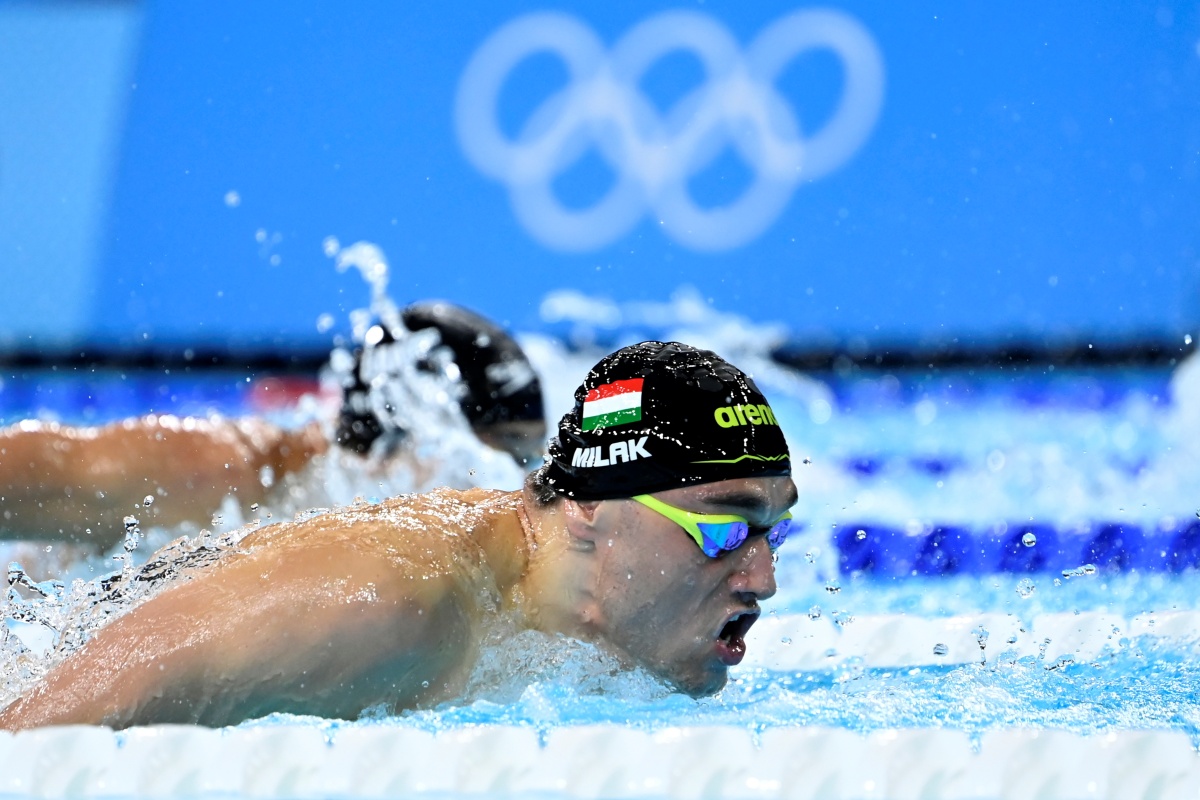
The Hungarian Olympic team currently has three medals. Continue reading
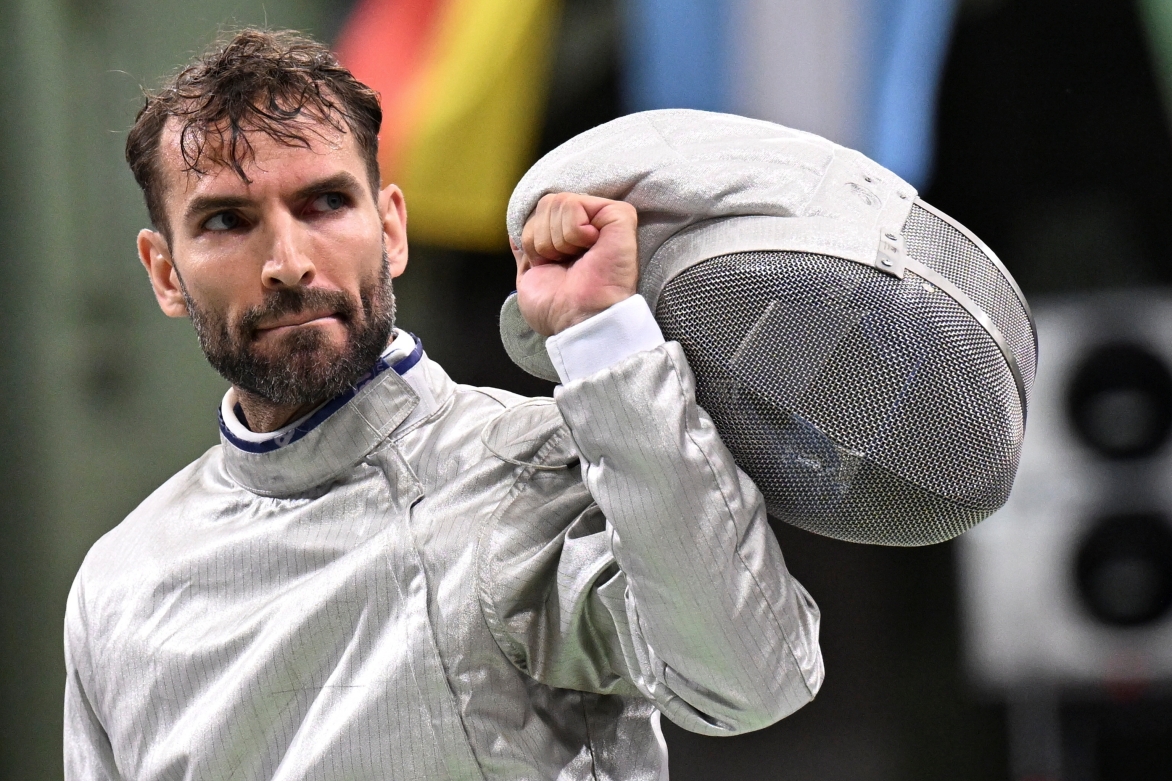
After making Hungary proud with yet another Olympic medal, Hungary Today was given a chance to ask our legendary fencing champion, Áron Szilágyi, a few questions about his motivation, about staying competitive in a later stage of his career, and for a message to our emerging younger generation of sportsmen and women. His answers are sure to inspire.
With three individual Olympic gold medals under your belt, you won a silver medal at the Olympics as a member of the Hungarian fencing team. What drove you to achieve the best possible performance, what motivated you to compete as a member team after your individual performance did not meet your expectations?
I came to Paris with a double goal, I really wanted to win my fourth individual Olympic title, but I finished very far from that and I was disappointed after my first round defeat. It was hard for me after winning three individual gold medals, but that is part of our sport, so I have come to accept since childhood that it is not the rankings, the paper form, but the form and actual performance on the day that counts, which is what my opponent was better at. Fortunately we had three days to tune into the team competition, to forget about the individual struggles and get in shape.
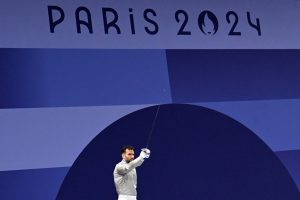
Photo: MTI/Illyés Tibor
How do you feel about the team silver medal?
We had a tough draw, we started against our big century-old opponents, the Italians, who we beat in a difficult but ultimately confident battle. Then we faced the unexpected Iranian team, who frankly we were not really prepared for because everyone was sure that the Americans would beat them. They surprised us, we were eight points down, but then came Krisztián Rabb, who did not worry about this being his first Olympics – he gave us one bravura after another. In the final, we were beaten by the three-time Olympic champion and four-time world champion Koreans, so there is no shame in that.
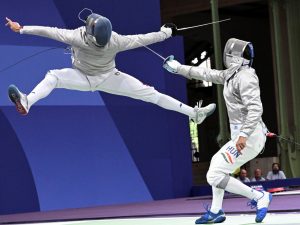
Áron Szilágyi (R) against Iran’s Ali Pakdaman. Photo: MTI/Illyés Tibor
How much has your motivation changed since your first Olympic appearance?
The enthusiasm and fire has always been there, of course it is different to be 22 years old, alone and without an Olympic medal, preparing for an olympic event than it is to be 34 years old, having won four medals. But somehow, during the whole preparation,
I had that childlike enthusiasm, that desire to be among the best. That is essential to do well.
In a recent study, Corvinus University analyzed the secrets of long-term athletic success in tennis players. They found that if a tennis player has won their first victory in a prestigious tournament, they can look forward to a successful, long career in sport. As a fencer, to what extent do you agree with this thesis, do you think that a first win also influences a sports career in the long term? What do you see as the secret to long-term success?
I see the key to success in humble work, because that will sooner or later bring the results on which confidence can be built. I competed in a lot of races before the London Olympics, I had five full seasons behind me, so although my individual career exploded with it, it was not without precedent. However, I was able to build on the confidence I gained there, but without changing my approach to work.
Today, competitiveness has become a key concept in sport, in the economy, and even in everyday life. To succeed, you have to be and stay competitive in all aspects of life. What can help an athlete to stay competitive? What are some practices in sport that can be applied in everyday life and, where appropriate, help to improve the competitiveness of individuals or even society as a whole?
For us athletes, it is all about competition and performance, so in all aspects of our lives we try to make sure that our choices, our behavior, our daily routine is geared towards performance, whether it is training and the work we put in, or nutrition, getting enough rest, mental health, physical preparation and much more. But I still think
the most important thing for a person and an athlete is self-awareness, so that everyone is aware of what works for them, what works for them, what fits their personality, what builds them up.
Everybody has to find their own way.
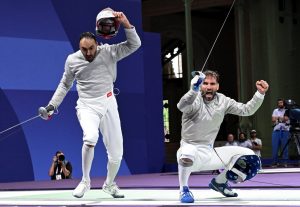
Áron Szilágyi (R) against Iran’s Ali Pakdaman. Photo: MTI/Illyés Tibor
In January this year, you received the International Fair Play Commission’s award for your sportsmanship in the final of the Gerevich-Kovács-Kárpáti World Cup in Budapest last March. What does Fair Play mean to you in sport and in everyday life?
I was brought up by my parents in a way that fair play is more important than the achievement itself. They taught me that a win is worth anything if I achieve it by giving my opponents the respect they deserve. I am always saddened when I hear about cheating, doping and match-fixing in sport, because it is the opposite of what sport is all about. But I am also happy to see many positive examples, and our sport is full of competitors who still hold these classic values dear.
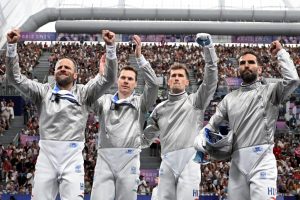
Csanád Gémesi, András Szatmári and Krisztián Rabb, Áron Szilágyi before the finals on July 31. MTI/Illyés Tibor
You have applied to join the International Olympic Committee (IOC) Athletes’ Commission. Unfortunately, this did not materialize, but what would have been your priorities as a committee member?
I did not apply for the Athletes’ Commission to put my own career first, but because I wanted to work for the representation of athletes and the Olympic movement. Even though I am not involved now, the goals remain the same. My whole career as an athlete is framed by the five Olympic Games I have participated in – I want to continue to build the Olympic movement not only as an athlete, I hope life will give me the opportunity to do so.
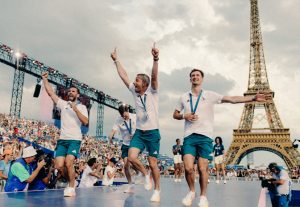
Photo: Facebook Áron Szilágyi (L)
Many young Hungarians could decide to take up fencing after the Olympics, after seeing it on television and after the experiences they have had – I am thinking of the silver medal of the men’s sabre team and the gold medal of the men’s epée team. What advice would you give to the youngest generation about their motivation and goals when entering the world of fencing?
My first memories are of the 2000 Olympics – as a kid, that was the first one I followed. It was then that I had the plan, the dream of going to the Olympics and winning a medal. My wish for today’s children is that they too dare to dream, because they can see that it is possible to achieve dreams. It is also possible to reach the top of the podium and sing the National Anthem as a Hungarian. I hope that many young people will be inspired by the many Hungarian Olympic stories that have been written here in Paris.
Featured Image: MTI/Illyés Tibor